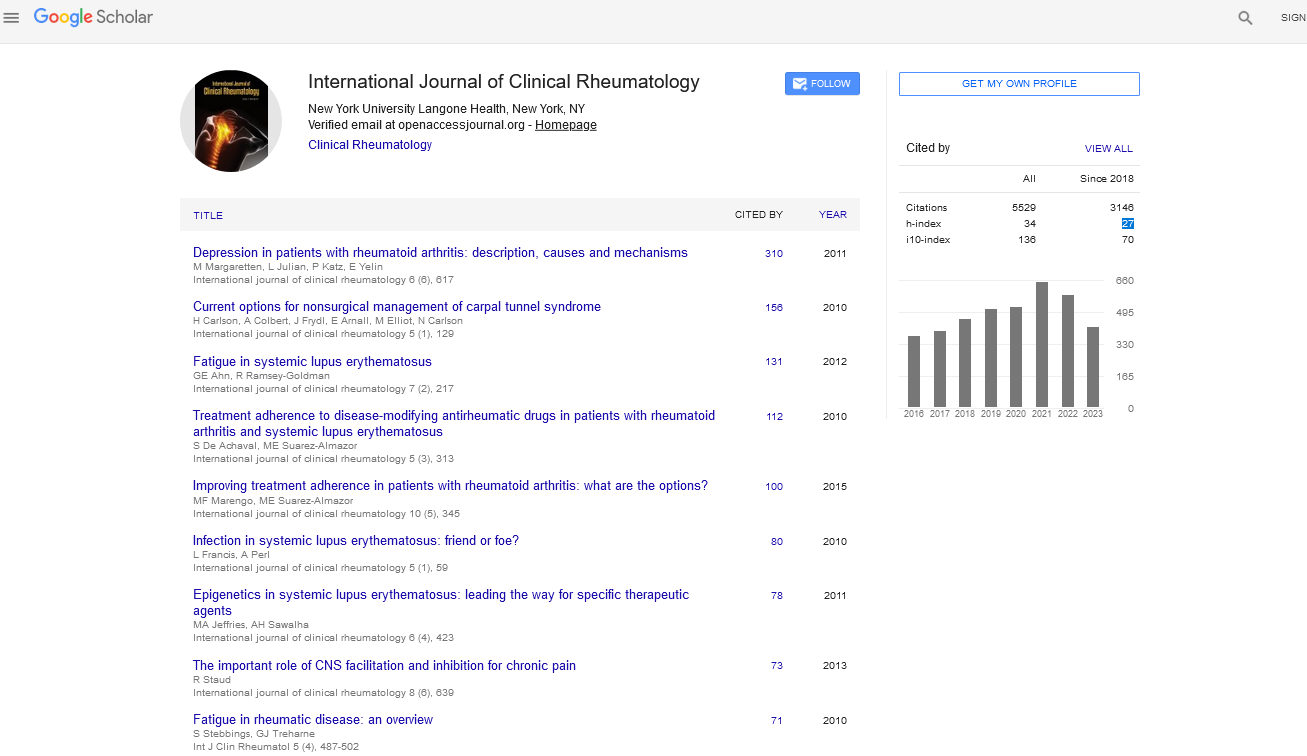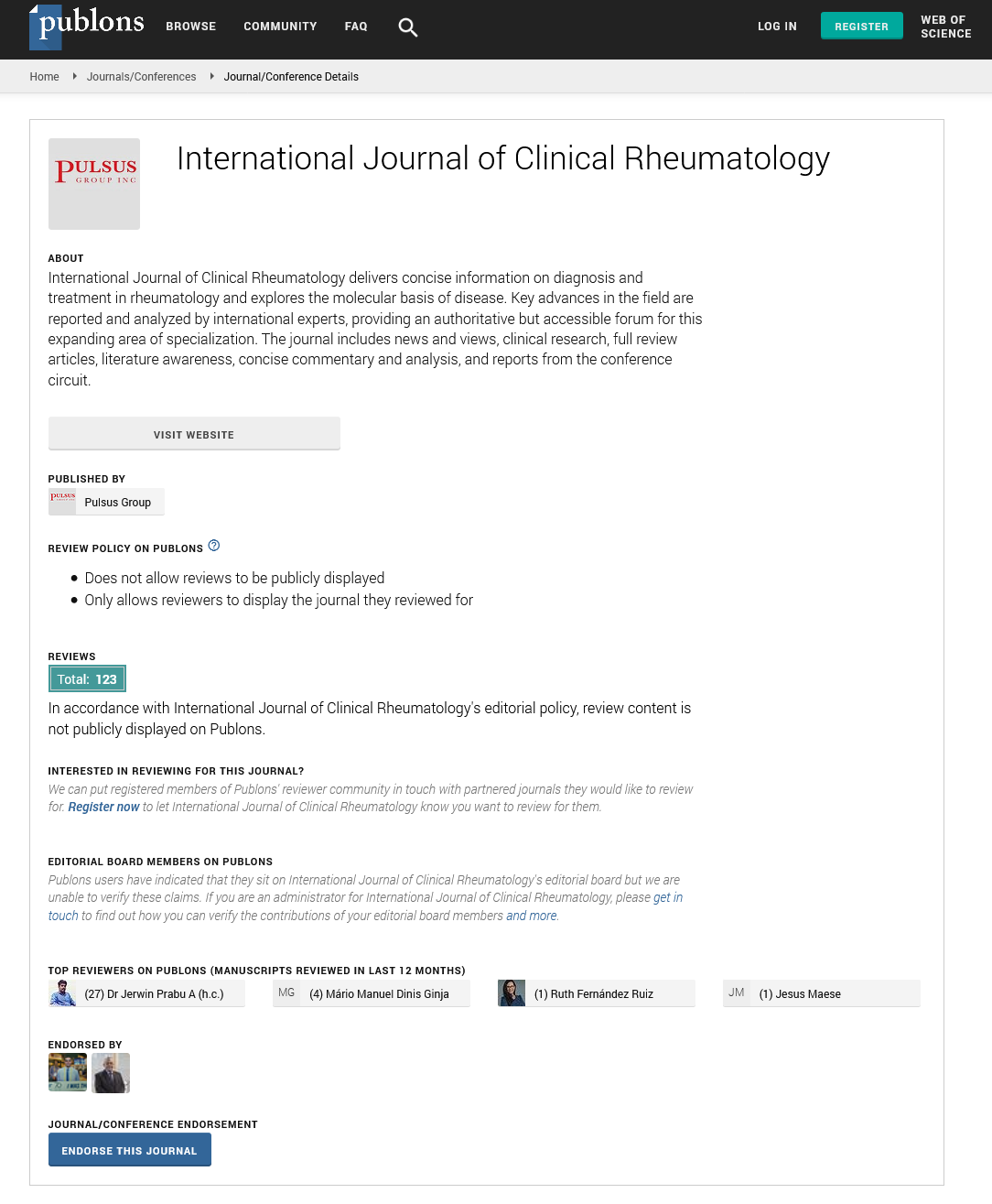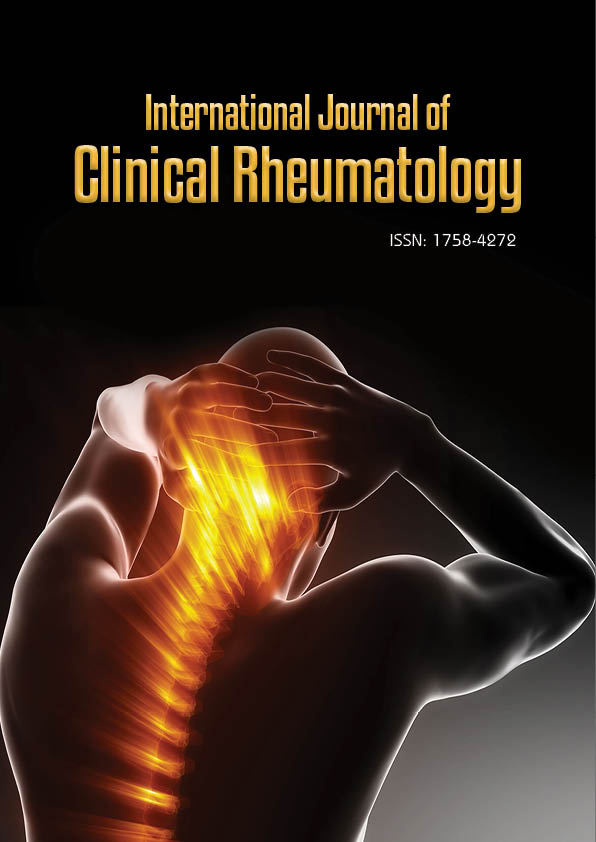Short Communication - International Journal of Clinical Rheumatology (2022) Volume 17, Issue 7
COVID-19 infection rates low in people with rheumatic diseases, most report mild illness
Ronald A Asherson*
Rheumatic Diseases Unit, University of Cape Town, Health Sciences Centre, Cape Town, South Africa
Received: 06-Jul-2022, Manuscript No. IJCR-22-128; Editor assigned: 07-Jul-2022, PreQC No. IJCR-22-128(PQ); Reviewed: 20-Jul-2022, QC No. IJCR-22-128; Revised: 25-Jul-2022, Manuscript No. IJCR-22-128(R); Published: 02-Aug-2022 DOI: 10.37532/1758-4272.2022.17(6).128-129
Abstract
Introduction
A new study shows that the COVID-19 infection incidence has been low in people with rheumatic diseases, and most of those infected experience a mild course of illness. Additionally, fatalities have been low among rheumatic disease patients infected with COVID-19 [1].
COVID-19 is the infectious disease caused by the novel coronavirus SARS-CoV-2. As the COVID-19 pandemic surged worldwide in early 2020, the risk of serious infection, complications or fatality was unknown for people with rheumatic disease. Many patients with rheumatic disease are treated with immunosuppressant medications that leave them more susceptible to infection [2].
Description
As the pandemic began, it was unclear how people with rheumatic diseases, on immunosuppressant therapy, were affected by a COVID-19 infection. Some early studies even suggested that these drugs could have a protective effect, but concerns remained about the vulnerability of this patient population [3]. To learn more, researchers conducted a systematic review of studies that reported outcomes of COVID-19 infection among patients with rheumatic diseases who were taking biologic and targeted therapies.
When the pandemic started, there was concern on whether to continue or hold immune therapies among patients with rheumatic diseases because they are at increased risk for infection. "We were interested to see if these patients are at an increased risk for COVID-19 infection. If they were to become infected, we wanted to know the severity of their clinical course. This can help us to determine whether it is safe to continue or hold immune therapies in setting of COVID-19 infection [4]."
The researchers systematically searched PubMed/Medline and Scopus to identify relevant studies from January to June 2020 that reported the outcomes of COVID-19 among patients with rheumatic disease. They extracted demographic information and patients' use of biologics or targeted therapy with Janus kinase (JAK) inhibitors. They measured the following COVID-19 outcomes: hospitalization, admission to an ICU and death. Based on their clinical symptoms, patients were split into two groups: severe, or having increased risk of respiratory failure or life-threatening complications or non-severe.
Conclusion
The final review included 6,095 patients with rheumatic diseases from eight observational cohort studies, with 28% having rheumatoid arthritis (RA) and 7% having psoriatic arthritis (PsA). Of the 6,095 patients, only 123 or 2% were positive or highly suspicious for COVID-19. Across all the studies used for the review, 68% of COVID-19 patients were taking biologics, with 31% taking anti- TNF drugs and 6% taking JAK inhibitors. Among those patients who were infected with the coronavirus, 91 or 73% were never hospitalized. Thirteen patients who were hospitalized required admission to an ICU and four patients died [5].
"In our analysis, there was a small number of patients on biologic and targeted therapies to make definite conclusions on whether to continue or hold therapies," says Dr. Sood. "We are waiting for additional extensive studies that include more patients with rheumatic disease on biologic and targeted therapies.
Another area of interest for us is examining risk factors for severe COVID-19 infection in patients with rheumatic disease. We hope this can help us identify which patients to closely monitor and possibly develop precautions to mitigate their risk."
References
- Bakasis AD, Mavragani CP, Boki KA et al. COVID-19 infection among autoimmune rheumatic disease patients: data from an observational study and literature review. J Autoimmun. 123, 102687 (2021).
- Grainger R, Machado PM, Robinson PC. Novel coronavirus disease-2019 (COVID-19) in people with rheumatic disease: epidemiology and outcomes. Best Pract Res Clin Rheumatol. 35(1), 101657 (2021).
- Hyrich KL, Machado PM. Rheumatic disease and COVID-19: epidemiology and outcomes. Nat Rev Rheumatol. 17(2), 71-72 (2021).
- Wahezi DM, Lo MS, Rubinstein TB et al. American College of Rheumatology Guidance for the Management of Pediatric Rheumatic Disease During the COVID‐19 Pandemic: Version 2. Arthritis Rheumatol. 73(8), e46-e59 (2021).
- Furer V, Eviatar T, Zisman D et al. Immunogenicity and safety of the BNT162b2 mRNA COVID-19 vaccine in adult patients with autoimmune inflammatory rheumatic diseases and in the general population: a multicentre study. Ann Rheum Dis. 80(10), 1330-1338 (2021).
Indexed at, Google Scholar, Crossref
Indexed at, Google Scholar, Crossref
Indexed at, Google Scholar, Crossref
Indexed at, Google Scholar, Crossref


